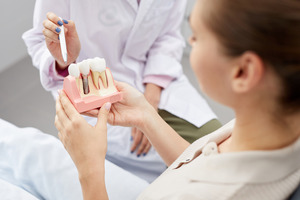
One of the main selling points of dental implants is their remarkable durability. When cared for well, they regularly last 20-30 years, or even a lifetime. They also have an incredibly high-success rate, with over 95% of dental implants succeeding at 20 years.
However, there are problems that could cause your dental implants to fail. Getting the most out of your tooth replacement means being taking good care of your implants—here are a few ways you can do that.
What Causes Dental Implant Failure?
To make your dental implant last, you need to understand what could go wrong. When implants fail, it’s usually for one of two reasons: peri-implantitis, or incomplete osseointegration.
Osseointegration
Dental implants are typically made from titanium, which has the unique capacity to fuse with bone tissue. This process is known as osseointegration, and it’s essential to the success of your implant.
In some circumstances, the process of osseointegration is delayed or interrupted. This can happen if you have a naturally impaired healing factor, or if you are indelicate with your implants soon after the surgery. Should this happen, it can severely compromise the integrity of your dental implant.
Peri-implantitis
Gum disease is a fairly common condition, but if left untreated it can become incredibly serious. This is especially true when it comes to dental implants.
When gum disease progresses, it can begin to seep under the gumline and attack the bone tissue holding the dental implant in place. This condition is known as peri-implantitis. If the disease is allowed to progress, it can severely compromise the foundation of your dental implant.
How to Prevent These Issues
If this information worries you, it shouldn’t—dental implants have a high success rate for a reason. Preventing these problems is simple so long as you’re careful.
During the healing process, be sure to follow your dentist’s aftercare instructions closely. This will allow osseointegration to proceed smoothly. You should also tell your dentist if you have an impaired healing factor, as this will need to be factored into your treatment plan.
To prevent infection, you only need to keep up with your dental hygiene. So long as your brush thoroughly, floss often, and see your dentist for regular cleanings you can expect your dental implant to stick around for decades to come.
About Our Practice
At Land, Walker, Moosavi and Moosavi Family Dentistry, we believe that dentistry is about more than just teeth. We’re in the business of treating people, which means getting to know them as individuals and understanding what they need to feel their best. We’re capable of performing the entire dental implants procedure in-house, meaning that when you come to us to replace your teeth, we’ll be with you for the whole process.
If you have any questions about dental implants, we can be reached at our website or by phone at (856) 235-0449.
